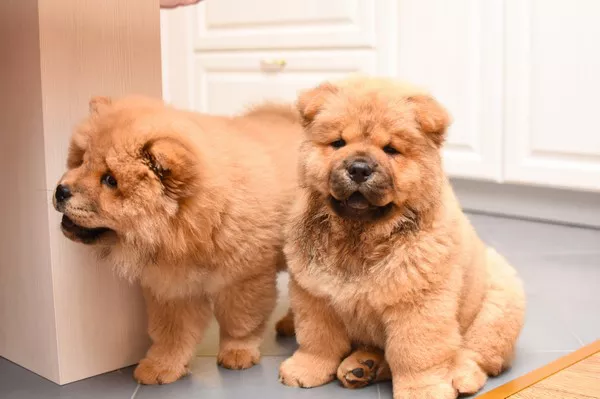Bringing home a new Chow Chow puppy is an exciting experience, but it also comes with the responsibility of providing proper care, training, and a loving environment. In this guide, we’ll walk you through the essential steps to ensure your Chow Chow puppy grows up happy, healthy, and well-adjusted.
1. Puppy-Proof Your Home:
Before bringing your Chow Chow puppy home, it’s crucial to puppy-proof your living space:
Remove or secure any potential hazards like toxic plants, electrical cords, and small objects that could be swallowed.
Use baby gates to restrict access to certain areas of your home.
2. High-Quality Puppy Food:
Choose a high-quality puppy food recommended by your veterinarian:
Chow Chows have sensitive digestive systems, so opt for a food formulated for puppies to ensure they receive the right nutrients.
Follow the feeding guidelines on the food packaging, adjusting portion sizes based on your puppy’s age and weight.
3. Regular Feeding Schedule:
Establish a consistent feeding routine:
Feed your Chow Chow puppy at the same times each day to help regulate their digestive system.
Avoid free-feeding to monitor their food intake and establish good eating habits.
4. Proper Training:
Chow Chows are intelligent but can be independent, so early training is essential:
Start with basic obedience commands like “sit,” “stay,” and “come.” Use positive reinforcement techniques, such as treats and praise.
Socialize your puppy by exposing them to various people, animals, and environments to prevent shyness or aggression.
5. Exercise and Play:
Chow Chows need daily exercise and mental stimulation:
Engage your puppy in regular play sessions and walks to burn off excess energy.
Provide toys that challenge their intelligence and keep them mentally stimulated.
6. Grooming:
Chow Chows have a dense double coat that requires regular grooming:
Brush their coat at least a few times a week to prevent matting and remove loose hair.
Expect more frequent brushing during shedding seasons.
7. Veterinary Care:
Regular vet visits are crucial for your puppy’s health:
Follow your veterinarian’s vaccination schedule to protect your puppy from common diseases.
Discuss flea, tick, and heartworm prevention with your vet.
8. Dental Care:
Chow Chows are prone to dental issues, so establish good oral hygiene habits:
Brush your puppy’s teeth regularly with a dog-specific toothbrush and toothpaste.
Provide dental chews or toys to help reduce tartar build-up.
9. Patience and Love:
Above all, show your Chow Chow puppy love and patience:
Chow Chows are known for their loyalty and bond strongly with their owners.
Be patient during training and remember that positive reinforcement goes a long way in building trust.
10. Neuter/Spay:
Discuss with your veterinarian the appropriate age for neutering or spaying your Chow Chow puppy to prevent unwanted pregnancies and certain health issues.
Conclusion
Raising a happy and healthy Chow Chow puppy requires commitment and care. By providing proper nutrition, training, grooming, and a loving environment, you can ensure that your Chow Chow grows into a well-adjusted and loyal companion.
FAQs related to taking care of a Chow Chow puppy:
1. How often should I feed my Chow Chow puppy?
Chow Chow puppies typically need to be fed three to four times a day. As they grow, you can gradually transition to two meals a day.
2. What’s the best way to house train a Chow Chow puppy?
Consistency is key. Take your puppy outside after meals, playtime, and naps. Praise and reward them when they eliminate outdoors, and be patient with accidents indoors.
3. How much exercise does a Chow Chow puppy need?
Chow Chows require moderate exercise. Plan for at least 30 minutes of daily exercise through play and walks. Avoid excessive exercise, especially in hot weather, due to their sensitivity to heat.
4. When should I start grooming my Chow Chow puppy?
Start grooming and brushing your Chow Chow puppy early to get them accustomed to the process. Regular grooming helps prevent matting and maintains their coat health.
5. Are Chow Chows good with children and other pets?
Chow Chows can be good with children and other pets when properly socialized from a young age. Early socialization is crucial to ensure they develop well-adjusted behavior.
6. How can I prevent my Chow Chow puppy from chewing on furniture and objects?
Provide appropriate chew toys and discourage chewing on furniture or belongings. Redirect their attention to toys when you catch them chewing on inappropriate items.
7. What vaccinations does my Chow Chow puppy need?
Common vaccinations for Chow Chow puppies include distemper, parvovirus, and rabies. Consult your veterinarian for a vaccination schedule tailored to your puppy’s needs.
8. What are common health issues in Chow Chow puppies?
Chow Chows are prone to certain health issues such as hip dysplasia, entropion (an eye condition), and skin problems due to their wrinkled skin. Regular veterinary check-ups are essential to monitor their health.
9. Should I crate train my Chow Chow puppy?
Crate training can be beneficial for housetraining and providing a safe space for your puppy. Ensure the crate is appropriately sized and comfortable for them.
10. How can I prevent my Chow Chow puppy from becoming aggressive or overly protective?
Proper socialization from an early age is essential to prevent aggression or overprotectiveness. Expose your puppy to various people, animals, and environments to build their confidence and reduce fear.


